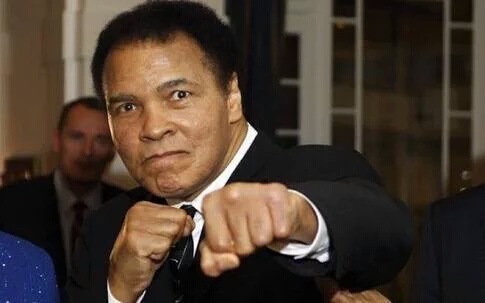We owe all this to a bicycle thief.
Muhammad Ali, 72, three times heavyweight boxing champion and sometimes poet, civil rights activist and phenomenal human being, who died in Phoenix of respiratory problems Saturday, began the sports that will turn him into legend after they stole his bicycle.
He was an unusual heavyweight, fast of lip and limb, with moviestar looks, astonishing people skills, and a pretanatural understanding of the mass media.
In 1960, he won the Olympic light heavyweight gold despite nursing a fractured thumb, and shortly after threw the medal into the river when a restaurant refused to serve him because he was black. He got a replacement medal at the Atlanta Olympics in 1984, the year he lit the Olympic flame.
Between those years, Muhammad Ali’s world had undergone a seismic change: he had converted to Islam under the promptings of Elijah Muhammed and dropped the name Cassius Clay, won three heavy weight championships, refused fighting in the Vietnam war, got himself sentenced to five years in jail with a ten thousand dollar fine, stripped of his title and banned from boxing, married and divorced at least three times, returned to boxing after three tortuous years, and retired from boxing with 56 wins from 61 fights.
He was the first athlete whose influence transcended his sports and whose appeal cut across all races and religions. His courage in the ring demonstrated so many times in so many titanic bouts with brawlers from Sonny Liston to Joe Frazier, and George Foreman, was on characteristic display outside the ring: in his blunt refusal to be drafted for an unjust war in Vietnam when no ‘Vietcong ever called me a nigger,’ his robust defence of Islam, and his battle against a disease that ravaged his body but couldn’t degrade his passion for life, or his inimitable smile.
He took the sports of boxing, originally seen as the forte of brutes and antisocial men with no education or finesse, and placed it on a pedestal. He was witty, trendy and eloquent, more than capable of holding his own against journalists and pundits, and absolutely charming.
For 32 years he fought this dreadful disease in what he confessed was his biggest fight ever, and as he aged his loud mouth mellowed and his hustle became a shuffle. Gone were the rhymes and the razzmatazz, the psychological warfare he used to destabilise opponents before every fight and after, adding to their trauma.
Frazier, who fought Ali thrice and suffered most from the man’s brutal hectoring never really forgave Ali before his death from liver cancer in 2011. Ali had called Frazier dumb and ugly, an Uncle Tom, the ‘Gorilla in Manilla’. “Joe Frazier is so ugly his face should be donated to the bureau of wildlife,” said Muhammad Ali.
Decades after that fight, Frazier continued to harbour evil against Ali, mocking the former champion’s Parkinson whenever he could. “Now people ask me if I feel bad for him,” said Frazier in his biography. “Nope. I don’t. Fact is, I don’t give a damn. They want me to love him but I will open up the graveyard and bury his ass when the Lord chooses to take him.”
Frazier would not be there to bury Ali however, and unlike him, the rest of the world has been more prodigal with its praise. When the man who once boasted that, “I done wrassled with an alligator, I done tussled with a whale. Only last week I murdered a rock, injured a stone, hospitalised a brick/ I’m so mean, I make medicine sick,” died in a hospital in Phoenix, the outpouring of grief was unanimous.
Even George Foreman, for whom he wrote that limerick, said a great part of him has died with Ali. “He meant so much to so many people that he will never die really,” he said. And Mike Tyson, despite himself, was able to rise to the occasion, “God came for his champion,” he said.
And so indeed He has.



